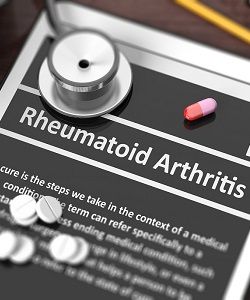Methotrexate Not Working for Rheumatoid Arthritis? Study Results Say Try Baricitinib
Patients who didn't respond to methotrexate may do well on baricitinib.

Patients with rheumatoid arthritis (RA) who haven’t had satisfactory results from methotrexate may find relief with baricitinib, according to a recent study conducted by Peter Taylor, MD, PhD, of the Nuffield Department of Orthopedics, Rheumatology, and Musculoskeletal Sciences and the Kennedy Institute of Rheumatology, at the University of Oxford, and colleagues.
Conventional synthetic disease-modifying antirheumatic drugs (DMARDs), like methotrexate and biologic DMARDs that target tumor necrosis factor (TNF), have made clinical remission possible for some people with RA. Baricitinib may inhibit activated Janus kinases (JAKs), which have been shown to play a role in the pathology of RA. The current study, called RA-BEAM, compared patient outcomes in three groups: 4 mg of baricitinib once daily, 40 mg of adalimumab every other week, and placebo.
All of the participants in RA-BEAM had received 12 weeks or more of methotrexate therapy and had an inadequate response, but did not have a history of biologic DMARD therapy. The study was randomized, double-blind, placebo-controlled, and was a parallel-group trial. It lasted 52 weeks and patients were drawn from 281 centers in 26 different countries.
“For the primary end point, baricitinib was compared with placebo on the basis of the proportion of patients at week 12 with a 20% response according to the criteria of the American College of Rheumatology (ACR20 response),” the authors described in The New England Journal of Medicine (NEJM). The ACR20 response means that there was a reduction in swelling and tenderness of 20% of the affected joints. Additionally, there was at least 20% improvement in at least three out of four other measures: the patient’s assessment of the pain, the physician’s global assessment of the disease, physical function, or the level of acute-phase reactant.

Of the 1,307 participants, about 86% completed the full 52 weeks of the trial, and the researchers said that a “large majority” joined a long-term extension. At week 12, the ACR20 response rate was 70% for those in the baricitinib group, compared to 61% for the adalimumab group and 40% for the placebo group.
At week 24, 5% of patients receiving baricitinib, 2% of those receiving adalimumab, and 3% of those receiving placebo had withdrawn due to adverse events. Rates of adverse events, infection being one of them, were similar between the baricitinib and adalimumab groups and higher than the placebo group.
The researchers noted that there were several limitations to this study, including the fact that ethical concerns mandated a rescue option at 16 weeks for patients receiving placebo., even though the design called for the use of placebo for 24 weeks. Patients remained blinded to their assigned group until the end of the study, but 27% of the placebo group received rescue treatment and 11% of them discontinued the placebo before receiving rescue treatment or being switched to baricitinib at week 24. Also, because only 15% to 18% of the participants had received conventional synthetic DMARDs prior to entering the study, the researchers were unable to assess the effectiveness of baricitinib when used in combination with synthetic DMARDs other than methotrexate.
“In conclusion, in patients with active rheumatoid arthritis despite receiving therapy with methotrexate, the addition of once-daily oral baricitinib was associated with improvements in signs and symptoms, physical function, patient-reported outcomes, and progression of structural joint damage as compared with placebo,” the researchers explained.
The study, “Baricitinib versus Placebo or Adalimumab in Rheumatoid Arthritis,” can be found in The New England Journal of Medicine. This research was sponsored by Eli Lilly and Incyte.
Related Coverage:
Is Rheumatoid Arthritis Really on the Decline?
Potential Rheumatoid Arthritis Blockbuster Gets First Approval
Adalimumab Biosimilar Meets Primary Endpoint in Rheumatoid Arthritis Trial